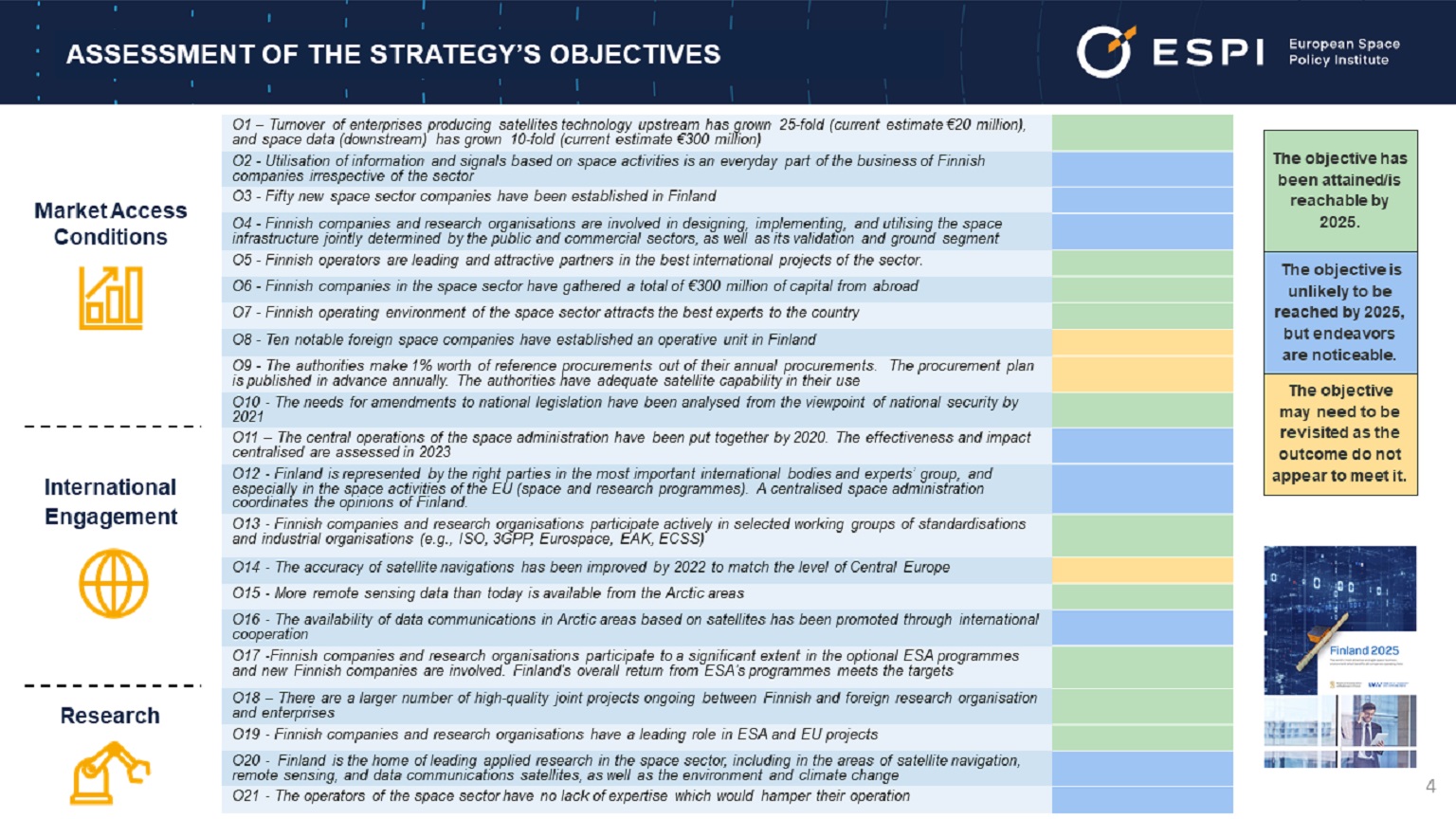
Space Strategy
On 20 December 2023, the Minister of Economic Affairs appointed a working group to prepare the updating of the national space strategy. The working group is led by the Ministry of Economic Affairs and Employment and it includes experts from a wide range of different administrative branches. The Finnish Space Committee serves as the steering group. The updated space strategy is due to be published towards the end of 2024.
Space Strategy 2018-2025
Finland's current space strategy was published in 2018. Its vision is to make Finland the world's most attractive and agile space business environment that benefits all companies operating here. The aim of the strategy is to promote growth and employment in the sector in Finland. The 21 objectives set for achieving the vision and the measures aimed at them are divided into three pillars: 1) conditions for market access, 2) international influence and 3) research.
In autumn 2023, the Ministry of Economic Affairs and Employment commissioned a report from the European Space Policy Institute (ESPI) on the implementation of the strategy objectives of the mid-term evaluation. It seems that the rather ambitious vision set in 2018 is largely being realised. Half of the objectives seem to be achieved as planned; one third is unlikely to be fully achieved, but considerable progress is being made towards this objective; with regard to the three objectives, the objective has been too ambitious or it has not been sufficiently influential.

Figure 1: European Space Policy Institute ESPI report on the progress made in the objectives of Finland's space strategy 2018-2025 in autumn 2023.
Changes in the operating environment
When the current space strategy was drawn up in 2018, the operating environment and the global situation looked very different from today's situation. Finland had become a full Member of ESA in 1995 and nearly all of our space activities revolved around ESA's research programme. Within this framework, a few space sector companies had already grown in Finland, building competence and operating culture within the framework of ESA programmes.
However, a transformation took place in Finnish space activities in 2017 – the first Finnish satellite Aalto-1 was launched into Earth orbit by Aalto University. The following year, the newly established company ICEYE launched the first Finnish commercial satellite into space. These two events inspired the preparation of a Finnish space strategy published in 2018.
During the strategy period, the development of the space sector has been rapid. At the end of 2023, the Ministry of Economic Affairs and Employment had granted a licence for 27 Finnish satellites, and Finnish space sector companies had raised approximately EUR 300 million in private funding. Space administration has invested in building a favourable operating environment: Finland has one of the most modern space legislation in the world that takes into account international treaties and the principles of sustainable use of space. At the European level, the most significant change during the strategy period has been the establishment of the EU Space Programme (EU 2021/696) in 2021.
Rapidly developed technology and the digitalisation of society have opened up new application areas where space services can be utilised in other sectors of society.
The tightening geopolitical situation and competition between superpowers have changed the security situation around the world: Space services have been identified as an important support activity for national security and different areas of warfare, opportunities for dual use of space systems built for civilian use and the need for technological self-sufficiency have been identified. Finland has also become a Member of the military alliance NATO.
Prospects for the future
In the future, space services will become an increasingly important part of society's functions. By utilising space services, many everyday matters, such as air traffic control or the planning of the flow of hydroelectric power plants, can be developed to be smoother, more efficient and safer. This brings not only a comfortable life but also significant economic savings and support the clean transition of society. Space services can be compared to the semiconductor industry as a support service for other technologies. According to a study conducted by the European Space Policy Institute ESPI, each euro invested in the development of space activities will return to society 6-7 times.
The transformation of the space economy is driven by new globally scalable business models, technological advances and reduced costs of space activities. They will bring competitiveness to the sector and lower the threshold for introducing new innovative solutions to the market. Strong technological expertise and advanced digitalisation in society support the development of space activities and the utilisation of space services in Finland.
Space services add a new significant layer to Finland's security of supply culture to complement other technologies. A broad and insightful technological understanding strengthens Finland's opportunities to build sustainable comprehensive security that also covers sparsely populated areas regionally.
Updating process and timetable of the space strategy
In December 2023, the Minister of Economic Affairs appointed a cross-sectoral working group led by the Ministry of Economic Affairs and Employment to prepare a national space strategy for 2024-2030. Attention was paid to adopting the use of space services in society outside the space sector. Particular attention will be paid to the needs and opportunities of security, defence and security of supply actors in adopting space services as part of other activities.
The working group will analyse the compiled background materials, consult various actors and prepare a draft national space strategy for 2024-2030. The draft will be sent out for open consultation and finalised on the basis of the feedback received. After consideration and approval by the Government, the completed strategy will be published as planned at the end of 2024. The Finnish Space Committee and its secretariat coordinate the implementation of the strategy.
Author: Tero Vihavainen works as Chief Specialist at the Ministry of Economic Affairs and Employment and as Secretary General of the Space Committee and chairs the working group preparing the space strategy.





